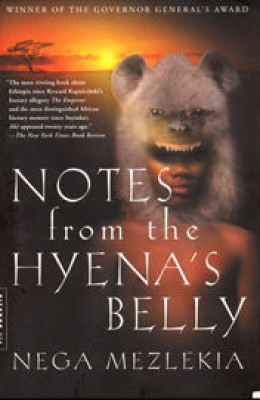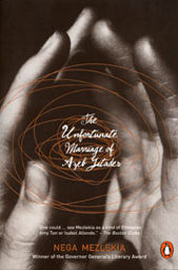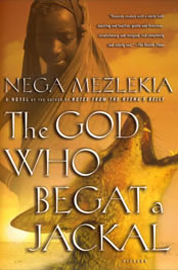Nega Mezlekia's Books

Notes from the Hyena’s Belly
In a narrative sparkling with wit, Nega Mezlekia recalls his boyhood in Jijiga, Ethiopia, during the fall of Emperor Selassie, and his bold journey to manhood during the rise to power of the communist Junta, whose merciless Red Terror slaughtered 100,000 Ethiopian youths. Out of this sun-drenched land where modern corruption rides ancient custom like a predator, Mezlekia crafts a world elegant in its aridity, extreme in its absurdity, and vast in its ironies.
WINNER OF THE GOVERNOR GENERAL‚ÄôS AWARD FOR NON-FICTION¬ÝSHORTLISTED FOR THE TRILLIUM AWARD
“A lively cast of characters … worthy of Gabriel Garcia Marquez … By skillfully interleaving personal history, politics and Amhara fables, Mezlekia has created a remarkable account of what it takes … to survive the complete shattering of civil society. … Mezlekia has summoned, with imaginative directness and impressive tonal range, a world of uncertainty in which politics is never just background but permeates ordinary life Рindeed, prevents it from ever being ordinary. He has produced the most riveting book about Ethiopia since Ryszard Kapuscinski’s literary allegory “The Emperor” and the most distinguished African literary memoir since Soyinka’s “Ake” appeared 20 years ago.”
- THE NEW YORK TIMES BOOK REVIEW
“An affecting, transporting memoir of growing up fast during the grim years following the overthrow of Haile Selassie in Ethiopia. … Mezlekia has a born storyteller’s knack for pacing, and in his musical voice he manages to convey the helter-skelter of his existence, the turmoil and carnage, without simply turning the narrative into a bloodbath. But spilled blood there definitely was … Throughout the narrative the author includes brief histories, traditional stories, tales of hunger, pieces of gossip, and landscapes, allowing for a real picture show in the mind’s eye that coalesces finally into a life. … A story of high drama told with aplomb, a story of the kind that allows readers to put their woes into perspective.”
- KIRKUS (Starred)
“This lyrical memoir of an Ethiopian childhood echoes both the myth and the violence of the hyena. … [Mezlekia] treats the chaos and famine that enveloped his country with seriousness and style … and even while recounting famine and war, he never loses the wit that no doubt helped him to survive some of the worst humanity has to offer. … This lovely and terrible memoir will undoubtedly be well reviewed and thus reach readers interested not only in the fate of Africa but also in a lyrical account of a foreign childhood.”
- PUBLISHERS WEEKLY
“It’s not just a remarkable story – it’s a remarkable story well told. With a novelist’s understanding of pacing and an enviable, arresting narrative voice, he recounts in the same measured tone boyhood pranks …and junta atrocities…. It’s the voice of Hans Christian Andersen or the Brothers Grimm, a voice that gently but not reluctantly informs the reader that good exists side by side with evil in this world and probably in the next, and that only a naïf (or maybe an American) would think otherwise.”
- Therese Eiben, POETS & WRITERS
“As much political history as personal memoir…well worth reading. Mezlekia is an articulate and affecting witness to an African tragedy that shows no signs as ending.”
- THE BOSTON GLOBE
“Nega Mezlekia’s riveting Notes from the Hyena’s Belly begins with a sentence both lyrically arresting and factually intriguing…and continues in a voice that is personal and political … Mezlekia’s eventual escape from a country of startling extremes – beautifully barren landscapes, droughts, floods, medicine men, and military juntas – [is] brought to bittersweet life by this exceptional writer.
- ELLE
“A stunning depiction of Ethiopia’s current culture and conflict.”
- BOOKLIST
“When I read his publisher’s accompanying note – before I had cracked the book open – and saw that the author’s memoir ‘deftly blends fact with fable, and parable with social history,’ my heart sank. A regime as terrible as Mengistu’s demands, I thought, dispassionate witness, not fable; sober testimony, not parable. How could you make things up more terrible than Mengistu’s use of mass starvation as apolitical technique, more appalling than the regime’s jocular prisons, where the death squads played I-see-you-I-see-you-not games with the terrified teenagers they had been sent to mutilate and kill? How could you be a fabulist when your mother was killed by a Somali rebel sniper’s stray bullet, your father assassinated, yourself jailed and tortured, forced into a guerrilla army? But I confess with relief that I was wrong. Mezlekia brings it off. The mix of humour, anecdote, parable and folk tale, blended with a clear-eyed view of what was happening around him, makes the regime more terrible, not less.”
- MARQ DE VILLIERS, in THE GLOBE AND MAIL
“Topical, moving, and fascinating, Nega Mezlekia concentrates his mind on his nation’s history as he tells his own tale in prose imbued with a sense of commitment to truth. It is the best memoir by an Ethiopian that I’ve ever read.”
- NARUDDIN FARAH, author of Maps and Secrets
“A masterful narrative that steeps the reader in Ethiopian folklore, myth, theology, and philosophy, blurring the boundaries between the spiritual and material worlds. Rich in wisdom, humor, and poetry, this is not simply the story of a boy coming of age, it is a portrait of a nation and its people.”
- GEORGE MAKANA CLARK, author of The Small Bees’ Honey
“The haunting essence of Nega Mezlekia’s powerful memoir is captured in his opening lines … Pregnant with premonition of the horrors to come, Mezlekia’s beginning gives birth to an Ethiopian childhood, providing us with a potent metaphor for Africa and the loss of innocence. … The Hyena’s Belly is reminiscent of Ben Okri’s The Famished Road: like Okri, Mezlekia evokes the startlingly fertile landscapes of a child’s imagination. … The sad backdrop to this engaging memoir is how a cultured, ancient, and biblical civilization, an intricate society of religious devotion, is destroyed by a military junta … As my father Ken Saro-Wiwa wrote, ‘Africa kills her suns, that’s why she is known as the dark continent.’”
- KEN WIWA, author of The Shadow of a Saint, in QUILL & QUIRE
“…[a] beautifully written and harrowing memoir…Mezlekia’s wry wit and sense of humour and irony light up the cloudy, stormy pages.”
- GAZETTE (Montreal)
‚ÄúAs writers from Jonathan Swift to Tennessee Williams have made clear, and as Job might have if he‚Äôd had time to write his own Book, the worse matters get, the funnier they can be made. This reliable literary theorem accounts for most of the laughs ‚Äì and there are a lot of them ‚Äì on Toronto writer Nega Mezlekia‚Äôs Notes from the Hyena‚Äôs Belly. The book is a memoir of his harried childhood in Ethiopia — almost equal parts wonder and humiliation ‚Äì as well as of events following the 1974 overthrow of Emperor Haile Selassie ‚Äì almost wholly horrific.‚Äù
- NATIONAL POST
“Beautifully written and harrowing … Save in its most heart-stopping moments, Mezlekia’s wry wit and sense of humour light up the cloudy, stormy pages.”
- CALGARY HERALD
“Notes from the Hyena’s Belly has been compared to Frank McCourt’s Angela’s Ashes, and even if Ireland seems pretty far removed from Ethiopia, the comparison is a good one. Despite several engineering degrees … Mezlekia is a poet whose simple lyrical style is hypnotic. Like McCourt, Mezlekia has a storyteller’s affection for the worst characters: dilettante conmen, religious fanatics, a hateful legless elementary school teacher who drags himself across the ground in a flour sack. Where the two books are most similar is in the bitter comedy created out of the bleakest circumstances.”
- MONTREAL MIRROR
“There is much in Notes from the Hyena’s Belly … that is reminiscent of the writings of Ben Okri and Gabriel Garcia Marquez … Mezlekia brings together Ethiopian history and his own testimony in prose that burns brightly, sometimes with wry humour, sometimes with fierce irony. Even in the harshest scenes there are passages of pure poetry. . . no matter where Mezlekia chose to stop, you’d want more.”
- THE TORONTO STAR
“Mezlekia has forged an absorbing and often delightful account of the first decades of his life. …It’s well worth the read.”
- EDMONTON JOURNAL
“Hauntingly lyrical…Ingeniously blending Ethiopian history and folklore in a narrative sparkling with wit … Mezlekia crafts a world elegant in its aridity, extreme in its absurdity, and vast in its ironies. … a vital political and social commentary about the state of affairs in Ethiopia.”
- AFRICA SUN TIMES
“A gorgeous narrative of growing up amid stunning brutality and starvation. … However, instead of bewailing and lecturing, he treats his life, his country and his eventual survival with zest, spinning tall tales and incidents of torture and starvation into one miraculous web. Between moments of murder, superstition and famine he often finds the joke – the real absurdity that lurks behind life.”
- THE VANCOUVER SUN
“A glimpse into Hell. By some feat of alchemy, Mezlekia has transformed the nightmare that was his life in Ethiopia into a gripping story. Mandatory reading for anyone trying to understand Africa today.”
- ERIC McCORMACK, author of First Blast of the Trumpet Against the Monstrous Regiment of Women
“Never mind a magical childhood, lovingly rendered; never mind a harrowing adolescence, told with dignity and quiet sorrow. What makes this memoir such a delight is the wonderment at crazy life and crazier fate, that informs every page.”
- CHARLES FORAN
“A marvellous book that sparkles with the innocence of youth while burning with the terror of an embattled and corrupt society. Nega Mezlekia gives us a glimpse of a country in turmoil, caught between its murderous history and the cynical intervention of superpowers, yet I often found myself smiling at the myths that sustained his family and laughing out loud at his descriptions of childish mischief. It’s a great read.”
- CHARLOTTE GRAY, author of Sisters in the Wilderness
“Fascinating … a delightful story at first, rather Frank McCourtish in that we are spared the suffering of the child, which is actually shocking and indefensible, in favour of the charm of village life. This provides a stunning contrast to the horror that follows. It deserves to be widely read.”
- SHARON BUTALA
“…a bittersweet but graceful evocation of youth in a world of turmoil and horror. This tale of an Ethiopian childhood is an elegant mix of the political and cultural, of innocence and experience. Writing with wry humour but without rancour, Mezlekia addresses the shared experiences and hopes of many Canadians.”
- GOVERNOR GENERAL’S AWARD JURY
“[Notes from the Hyena’s Belly] makes you weep and giggle simultaneously. . .”
- NOW Magazine (Toronto)

